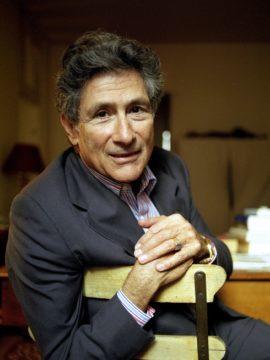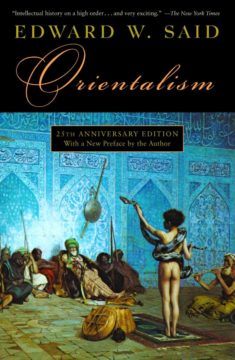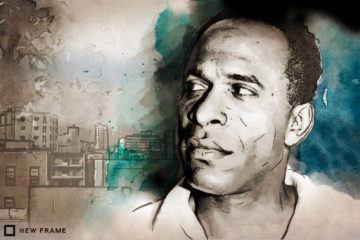by Claire Chambers

Few twentieth-century books witnessed Silver Jubilee celebrations but, 25 years after the publication of Edward Said’s Orientalism (1978), the monograph was commemorated in this way at his faculty in Columbia University, New York. Just a few months later, in September 2003, the Palestinian-American literary critic and theorist would die at 67 after protracted dealings with leukaemia. (This was the same group of cancers that had caused the quick and untimely death of one of his anticolonial forebears, Frantz Fanon, in 1961.) Said’s volume is routinely hailed in lists of the world’s most influential books. It also continues to shape the discipline of postcolonial studies which his work kickstarted. The Golden Jubilee in 2028 should be a grand affair.
Orientalism’s groundbreaking importance lies in the connections Said makes between culture and empire-building. He draws on Michel Foucault’s theories about the inextricable coexistence of power and knowledge, as well as Antonio Gramsci’s emphasis on the importance of culture in securing the consent of the dominated. In doing so, Said argues that colonization is not only about material acquisition. In addition to physically occupying other countries, colonizers seek to convey that their occupation is universally advantageous. It is absurd to watch the intellectual gymnastics they undertake in arguing that empire is good for both rulers and ruled.
One of the central tenets Said takes from Foucault is the recognition that power does not simply reside with one individual or a small cartel, but rather penetrates all areas of life. Indeed, power is not a commodity that can be possessed, but a fluid set of social relations. Meanwhile, the Gramscian idea of hegemony also influences Said’s intellectual universe. Outside of a dictatorship, rulers have to persuade the people that they (the rulers) hold power in everybody’s best interests. Mahatma Gandhi once pointed out that if all the hundreds of thousands of Indians stood together and spat in unison, they would drown the British and end their Raj. But the British used divide and rule tactics to set communities against each other and prevent such solidarity. And this witty metaphor also illustrates that for a small number of British traders and administrators to rule over the vast subcontinent of India, there had to be a certain amount of agreement on the part of the colonized. The way in which the colonizers achieved this implicit agreement was through the deployment of both literary and academic texts which easily persuaded their own people and slowly encouraged some Indians (especially those being favoured) to internalize the notion that the British were superior.
Consent is in part achieved, Said indicates, through a deployment of the diction of ‘us’ and ‘them’:
[The] imaginative geography of the ‘our land–barbarian land’ variety does not require that the barbarians acknowledge the distinction. It is enough for ‘us’ to set up these boundaries in our own minds; ‘they’ become ‘they’ accordingly, and both their territory and their mentality are designated as different from ‘ours’.
Imaginative geographies of us and them are created, in which differences between groups of people are exaggerated and borders sharply demarcated. Elsewhere in the book, Said writes: ‘A line is drawn between two continents’, namely Europe and Asia. And in the above block quote another duality emerges, between supposedly civilized ‘us’ and ‘the barbarians’. That barbarians are said to be at the gate is really a way of demarcating the Self and its boundaries. Orientalism has formulated and continues to peddle these terms so as to cast ‘us’ in a positive light while denigrating those who live differently elsewhere. The devastating consequences of this dehumanization of the Other continue to have repercussions today. Instead of challenging the hate-filled binaries of ‘us’ and ‘them’, groups like Al Qaeda and ISIS simply flip them on their head – with devastating consequences.
and borders sharply demarcated. Elsewhere in the book, Said writes: ‘A line is drawn between two continents’, namely Europe and Asia. And in the above block quote another duality emerges, between supposedly civilized ‘us’ and ‘the barbarians’. That barbarians are said to be at the gate is really a way of demarcating the Self and its boundaries. Orientalism has formulated and continues to peddle these terms so as to cast ‘us’ in a positive light while denigrating those who live differently elsewhere. The devastating consequences of this dehumanization of the Other continue to have repercussions today. Instead of challenging the hate-filled binaries of ‘us’ and ‘them’, groups like Al Qaeda and ISIS simply flip them on their head – with devastating consequences.
According to Said, the Orient is an invention. ‘It is not merely there’, he writes, and nor is the Occident. Instead, these entities are created. Said asserts that Western scholarship and even that supposed bastion of cultural transcendence, art, produces an image of the so-called Orient as the Other. Ideas about non-Western peoples are a fantasy created by centuries of ‘Orientalism’.
The term Orientalism denotes both scholarly and popular representations of the East. This expertise and creative work helps to legitimate Europe’s colonial expansion into non-Western countries. Orientalism is also a way of thinking and a discourse (a term he borrows from Foucault, to denote a tradition or a collection of written or spoken ideas). This Euro-American discourse, vast as it might appear, is actually quite limited in the pictures of the East it paints. These rest on just a few ‘typical encapsulations: the journey, the history, the fable, the stereotype, the polemical confrontation’. Such restrictive tropes eclipse the Orient, moulding and constraining what can be said about the East–West encounter.
What is more, the Orient created by Orientalism is a collage pasted on a common backdrop or, as Said puts it, an imaginative geography. A jumbled picture of Arab and Islamic worlds is layered onto this canvas, centring on North Africa and the Middle East and spilling over into any place where Arab and/or Muslim men come into contact with others. Such an imaginative geography exists primarily in the Euro-American mind. However, it is mapped onto real people and places, forming the lens through which events are interpreted. This is a figurative place of misery, where tyrannical men objectify and exploit women and girls, religious charlatans mislead their followers, and rich despots keep the majority of their subjects in abject poverty.
Said argues that Orientalist texts define the Orient through what he calls binary oppositions, a phrase found in Linguistics. These writings characterize the East as being everything the West is not; its alter ego in other words. Such thinking is condensed in the famous lines of the British poet of India, Rudyard Kipling: ‘O, East is East, and West is West, and never the twain shall meet’. The East is always stereotyped as the inferior partner, irrational, primitive, and weak. This Otherizing enables the West’s self-definition as rational, modern, and strong. Non-Western people are seen as being instinctive, while Europeans are rational; the rest are portrayed as barbaric, while the West is supposedly civilized. The Orient is therefore the West’s ‘surrogate and underground self’. These structures of opposites put the West in prime of place and, Said avers, it never loses ‘the relative upper hand’. To make someone Other is to stereotype them and depict them as outlandishly different from oneself. That Self is assumed to be stable and normal, and in this way Otherizing helps with identity-formation.
Until Said’s intervention, literature and culture had usually been presumed to be apolitical, ‘even historically innocent’. But in fact knowledge, including the humanities and creative texts, is political. Knowledge is power, and Orientalism is extractivist and controlling. Indeed, academic and artistic texts have confected an image of the Other that is inextricable from colonialism. This is a realization that Fanon and Said were two of the first to express.
Said deplores that Oriental peoples have been for centuries treated as the Other. The racial Other is usually painted in disparaging, unfamiliar hues. His consciousness is said to be wired differently. (Here I use the male pronoun because Said, immersed as he is in colonial discourse with its ‘sexist blinders’, follows this usage.) The colonized subject is somehow violent and threatening, weak and contemptible, at one and the same time.
In colonial discourse, even apparent admiration for the Other functions to mask exoticism and structural domination. If the Orient is praised it is to breathless excess, and that too only to highlight some flaw in the Occident perceived to be in need of remedy. Momentary unbridled acclaim for the East swiftly results in backlash: ‘A swing of the pendulum in one direction caused an equal and opposite swing back: the Orient was undervalued’. Both under- and overvaluation is damaging to those being represented.
 To articulate how the colonizer constructs the Other’s reality, in Black Skin, White Masks Fanon had used the word ‘transitivity’ or transference (the French noun transitivisme is carried across to English variously by translators), as follows:
To articulate how the colonizer constructs the Other’s reality, in Black Skin, White Masks Fanon had used the word ‘transitivity’ or transference (the French noun transitivisme is carried across to English variously by translators), as follows:
Th[e] mechanism of projection or, if you prefer, transitivity, has been described in conventional psychoanalysis. Whenever I discover something out of the ordinary, something reprehensible in me, I have no other alternative but to get rid of it and attribute its paternity to someone else.
Linguistics is once again helpful for our understanding of the Other as the Self’s own reification out of the feelings and ideas it has chosen to expel. As in languages with transitive verbs, the Other is needed to complete the thought. The direct object for the European is the black person (according to Fanon) or Oriental (Said), against whose subordination he can finish the thought about his own supposedly superior identity. Thus, via transference or binary oppositions, imperialists use the Other to reinforce the Self’s sense of superiority. In addition, the Martinican psychiatrist-turned-Algerian-revolutionary Fanon pluralizes the term Other, examining how ‘others’ turn to violence, ‘sharpening their weapons’ as they reject the colonizers’ construction of them as animalistic.
Returning to Orientalism, Said observes:
Everyone who writes about the Orient must locate himself vis-à-vis the Orient; translated into his text, this location includes the kind of narrative voice he adopts, the type of structure he builds, the kinds of images, themes, motifs that circulate in his text – all of which add up to deliberate ways of addressing the reader, containing the Orient, and finally, representing it or speaking in its behalf.
Here the Orient is a foreign language to be translated, and a backdrop against which to showcase the apparent complexities of the Occidental mind. Orientalism deals in domestication and containment, categorizing and captioning Others like exhibits in a museum. Small wonder, then, that Said takes a telling epigraph from Karl Marx (whose racial politics he came under fire from Marxists for critiquing): ‘They cannot represent themselves; they must be represented’.
The Other that Said examines is largely Muslim and Arab. An outspoken proponent of the Palestinian cause and opponent of Islamophobia, Said is often taken to have followed the Islamic religion but was in fact ‘a Christian who is culturally Muslim’. He had been born in 1935, in Jerusalem, then part of Palestine. His parents, sisters, and he belonged to a Protestant minority in a largely Muslim region. As a child, he moved with his parents to Cairo, spending formative years in Egypt, Palestine, and later America. In 1948, the state of Israel was carved out of Palestinian territory, at which time his family lost their home. Said freely admitted that his family’s relative wealth and their possession of a second house in Egypt meant that they did not suffer the hardships that many Palestinians felt after the events of 1948. However, after studying in the United States and seeing the mainstream media’s relentlessly one-sided and ill-informed stereotypes that prevail when ‘covering Islam’ (to quote the title of his 1981 monograph), Said became increasingly political. He wrote passionately and persuasively about the Nakba and its aftermath, for example in The Question of Palestine (1979). He also brings his own biography into Orientalism to explain his interest in the Islamo-Arab Orient. Not for him was the pretence at lofty objectivity professed by the Orientalists.
Like Fanon, Said recognized that imperialism cannot be defeated just by physically removing the colonizers from power. Rather, formerly colonized people also need to ‘decolonize the mind’, to adapt Ngũgĩ wa Thiong’o’s words. In other words, they have to change the negative ways of viewing themselves that have been encouraged by colonial discourse. This is a fundamental argument of many postcolonial thinkers. Worldly readers from East and West should try to overcome the coercive ways of reading that have been promulgated by colonialism.
Following Orientalism’s publication, there was an outpouring of academic works about colonial discourse and the ‘postcolonial condition’. Novels such as Joseph Conrad’s Heart of Darkness and E. M. Forster’s A Passage to India, which explicitly explored imperialism, were examined anew in the light of Said’s theory of Orientalism – not least by Said himself in his 1993 book Culture and Imperialism. Moreover, texts such as William Shakespeare’s The Tempest, Charlotte Brontë’s Jane Eyre, and Jane Austen’s Mansfield Park, which on the surface seemed to have little to do with the colonial project, were also examined for their latent assumptions. Finally, critics looked to the colonized and formerly colonized themselves to find cultural counter-currents.
Censure has been levelled at Orientalism for gender-blindness; overemphasis of culture; inattention to the specificities of history, ‘the West’ and its individual scholars; neglect of indigenous counter-representations or resistance; and philosophical inconsistencies, inter alia. Some of these charges are addressed in Said’s later essays. However, arguably Orientalism is more relevant than ever in our Manichean post-9/11 political climate. This is particularly the case as bombs once again rain down on Palestine amid the euphemistic ‘both-sidesism’ of much international journalism. Scholars of Muslim history, politics, and culture (including myself) have sadly found Orientalism continuously relevant for its discussion of stereotypes and the culturally imperialist construction of a bifurcated ‘West’ versus ‘Muslim world’.
specificities of history, ‘the West’ and its individual scholars; neglect of indigenous counter-representations or resistance; and philosophical inconsistencies, inter alia. Some of these charges are addressed in Said’s later essays. However, arguably Orientalism is more relevant than ever in our Manichean post-9/11 political climate. This is particularly the case as bombs once again rain down on Palestine amid the euphemistic ‘both-sidesism’ of much international journalism. Scholars of Muslim history, politics, and culture (including myself) have sadly found Orientalism continuously relevant for its discussion of stereotypes and the culturally imperialist construction of a bifurcated ‘West’ versus ‘Muslim world’.
I wouldn’t be researching postcolonial literature were it not for Said, and Orientalism still informs and nourishes my teaching. Said and Fanon were the first theorists I truly engaged with, not least for their emphasis on material exploitation as well as representations. To be fair, the other members of postcolonial theory’s ‘Holy Trinity’, Homi K. Bhabha and Gayatri Chakravorty Spivak, have since his death leaned closer to Said’s accessible writing style and real-world concerns. However, their work still seems abstract and recondite when measured against Said’s fearless and unerringly humane arguments. More than 40 years after its publication, Orientalism’s clarion call for our studies of each other to be responsible, responsive, and reciprocal is more urgent now than ever.
